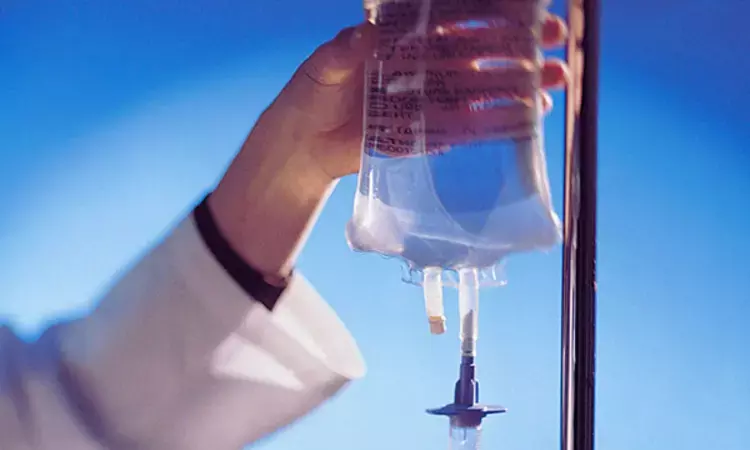- Home
- Medical news & Guidelines
- Anesthesiology
- Cardiology and CTVS
- Critical Care
- Dentistry
- Dermatology
- Diabetes and Endocrinology
- ENT
- Gastroenterology
- Medicine
- Nephrology
- Neurology
- Obstretics-Gynaecology
- Oncology
- Ophthalmology
- Orthopaedics
- Pediatrics-Neonatology
- Psychiatry
- Pulmonology
- Radiology
- Surgery
- Urology
- Laboratory Medicine
- Diet
- Nursing
- Paramedical
- Physiotherapy
- Health news
- Fact Check
- Bone Health Fact Check
- Brain Health Fact Check
- Cancer Related Fact Check
- Child Care Fact Check
- Dental and oral health fact check
- Diabetes and metabolic health fact check
- Diet and Nutrition Fact Check
- Eye and ENT Care Fact Check
- Fitness fact check
- Gut health fact check
- Heart health fact check
- Kidney health fact check
- Medical education fact check
- Men's health fact check
- Respiratory fact check
- Skin and hair care fact check
- Vaccine and Immunization fact check
- Women's health fact check
- AYUSH
- State News
- Andaman and Nicobar Islands
- Andhra Pradesh
- Arunachal Pradesh
- Assam
- Bihar
- Chandigarh
- Chattisgarh
- Dadra and Nagar Haveli
- Daman and Diu
- Delhi
- Goa
- Gujarat
- Haryana
- Himachal Pradesh
- Jammu & Kashmir
- Jharkhand
- Karnataka
- Kerala
- Ladakh
- Lakshadweep
- Madhya Pradesh
- Maharashtra
- Manipur
- Meghalaya
- Mizoram
- Nagaland
- Odisha
- Puducherry
- Punjab
- Rajasthan
- Sikkim
- Tamil Nadu
- Telangana
- Tripura
- Uttar Pradesh
- Uttrakhand
- West Bengal
- Medical Education
- Industry
Compared to conservative fluid resuscitation strategies, guideline-directed fluid resuscitation potentially harmful in sepsis with ESRD: Study

USA: A recent systematic review and meta-analysis has revealed significant findings regarding fluid resuscitation strategies for end-stage renal disease (ESRD) patients presenting with sepsis. The study challenges widely held assumptions about the benefits of guideline-directed fluid resuscitation (GDFR) in this vulnerable population, suggesting that this approach might not only be less effective than previously thought but could also pose potential risks.
"Our research challenges the prevailing assumption regarding the effectiveness of GDFR for sepsis patients with end-stage renal disease," the researchers wrote in the Journal of Intensive Care Medicine.
Sepsis, a severe and often life-threatening infection, frequently necessitates fluid resuscitation to stabilize blood pressure and improve organ perfusion. For patients with ESRD, however, this treatment can be particularly complex due to their compromised renal function. Traditionally, GDFR—an aggressive strategy aimed at achieving specific hemodynamic targets through fluid administration—has been considered a key intervention for managing sepsis in critically ill patients.
Against the above background, Georges Khattar, Department of Internal Medicine, Staten Island University Hospital/Northwell Health, Staten Island, NY, USA, and colleagues aimed to examine the efficacy and safety of guideline-directed fluid resuscitation compared with conservative fluid management in ESRD patients with sepsis by evaluating 90-day mortality and intubation rate.
For this purpose, the researchers conducted a systematic review adhering to PRISMA guidelines, searching multiple databases with specific keywords and controlled vocabulary. The search, conducted up to October 1, 2023, aimed to identify studies on fluid resuscitation in ESRD patients with sepsis.
The review process was streamlined using Covidence software, with a fourth reviewer addressing any discrepancies in study inclusion. The analysis employed a random-effects model with the Mantel–Haenszel method to integrate odds ratios (ORs) and included sensitivity analysis and publication bias assessment.
Based on the study, the researchers reported the following findings:
- Of the 1274 identified studies, 10 were selected for inclusion, examining 1184 patients, 593 of whom received GDFR. Four studies were selected to investigate the intubation rate, including 304 patients.
- There were no significant mortality or intubation rate differences between the groups [OR = 1.23 and OR = 1.91].
- In most studies, sensitivity analysis using the leave-one-out approach revealed higher mortality and intubation rates.
- The Egger test results indicated no statistically significant publication bias across the included studies.
"The results indicate that goal-directed fluid resuscitation is not more effective than a conservative resuscitation strategy for patients with sepsis and end-stage renal disease and may even be harmful. This highlights a significant research gap, underscoring the need for further studies to better understand the optimal approach in this area," the researchers concluded.
Reference:
Khattar, G., El Gharib, K., Pokima, N., Kotys, J., Kandala, V., Mina, J., Haddadin, F., Abu Baker, S., Asmar, S., Rizvi, T., Flamenbaum, M., Elsayegh, D., Chalhoub, M., El Hage, H., & El Sayegh, S. (2024). Fluid Resuscitation Dilemma in End-stage Renal Disease Patients Presenting with Sepsis: A Systematic Review and Meta-analysis. Journal of Intensive Care Medicine. https://doi.org/10.1177/08850666241261673
Dr Kamal Kant Kohli-MBBS, DTCD- a chest specialist with more than 30 years of practice and a flair for writing clinical articles, Dr Kamal Kant Kohli joined Medical Dialogues as a Chief Editor of Medical News. Besides writing articles, as an editor, he proofreads and verifies all the medical content published on Medical Dialogues including those coming from journals, studies,medical conferences,guidelines etc. Email: drkohli@medicaldialogues.in. Contact no. 011-43720751


